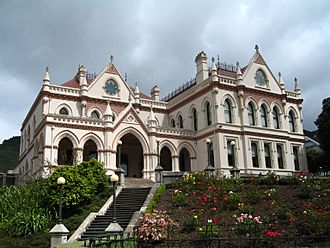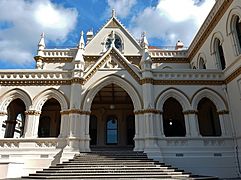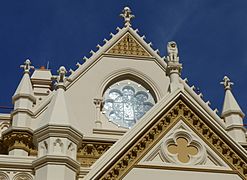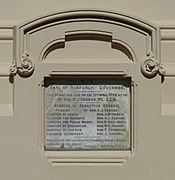New Zealand Parliamentary Library facts for kids
Quick facts for kids Parliamentary Library |
|
|---|---|
|
Te Whare Pukapuka o te Paremata (Māori)
|
|

The Parliamentary Library building in 2006
|
|
| Former names | General Assembly Library |
| General information | |
| Type | Library |
| Architectural style | Gothic Revival |
| Town or city | Wellington |
| Country | New Zealand |
| Coordinates | 41°16′38″S 174°46′36″E / 41.27723°S 174.77666°E |
| Construction started | 1897 |
| Completed | 1899 |
| Technical details | |
| Structural system | Brick |
| Design and construction | |
| Architect | Thomas Turnbull John Campbell |
| Designated: | 20 July 1989 |
| Reference #: | 217 |
| References | |
| NZHP website | |
The New Zealand Parliamentary Library (which in Māori is Te Whare Pukapuka o te Paremata) is like a giant information hub for the people who work in the New Zealand Parliament. It's where MPs (that's short for Members of Parliament) and their staff find all the facts and research they need. The main library building in Wellington is super old and special. It was finished in 1899 and is the oldest building still standing in the whole Parliament complex. You can find it right next to Parliament House.
Contents
A Library Built to Last
The Parliamentary Library was first designed by an architect named Thomas Turnbull. He planned it to be a three-story building in a style called Gothic Revival. This style looks a bit like old castles or churches, with pointy arches and fancy decorations.
A really important part of the design was that it was built to be fire-resistant! It was made from bricks from Mount Cook gaol (a prison). A strong iron firedoor also separated the library from the main entrance. This was a smart idea.
Changes During Building
The original plan for three stories was changed to save money. The building ended up costing £50,000, which was a lot back then! So, the third floor wasn't built. Another architect, John Campbell, finished the building. He had to redesign the roof and other parts to fit the shorter height. Thomas Turnbull was so unhappy with these changes that he asked for his name to be removed from the foundation stone.
Saved by Fireproofing
The fireproofing worked perfectly! In 1907, a big fire destroyed the rest of the wooden Parliament buildings. But the library, with its brick walls and iron door, was saved. It's a bit like what happened in Ottawa, Canada, in 1916. There, a fire destroyed much of the Canadian Parliament, but the Library of Parliament was saved by its fire doors too!
Modern Updates and Preservation
Just like Parliament House, the library building got a big upgrade between 1993 and 1995. It was made stronger and refurbished. This means it was repaired and updated. The goal was to make it look just like the original designs.
Restoring Beauty
The fancy main entrance area, called the foyer, had been damaged by another fire in 1992. It was carefully restored to its original beauty. All the cool Gothic details on the roof, like the ironwork, small towers (turrets), and pointy decorations (finials), were rebuilt. Even the original iron door, which saved the library from the 1907 fire, was fixed up and put back in place.
The building is very important to New Zealand's history. It's officially listed by the New Zealand Historic Places Trust as a Category I heritage structure. This means it's one of the most important historic places in the country.
What the Library Does Today
The Parliamentary Library is a special place for information and research. It helps Members of Parliament and their staff. They use it to find facts and do research for their work in government. Most people can't just walk in, as access is usually for those working on parliamentary business. However, the research papers and reports the library creates are available for everyone to read.
Growing and Changing Collections
The library's collection of books and information grew a lot over the years. By the 1920s, it had over 100,000 books! By 1950, that number had doubled to 200,000. In 1966, the Parliamentary Library became part of the new National Library of New Zealand. Many of its books (almost half a million!) were moved to other National Library locations. But the most important books for Parliament stayed in the beautiful Gothic building. In 1985, the Parliamentary Library became its own service again, separate from the National Library.
Gallery
 | Toni Morrison |
 | Barack Obama |
 | Martin Luther King Jr. |
 | Ralph Bunche |




